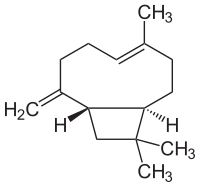
Photo from wikipedia
β-Caryophyllene is a plant-derived bicyclic sesquiterpene with multiple biological functions. β-Caryophyllene production by engineered Saccharomyces cerevisiae represents a promising technological route. However, the low catalytic activity of β-caryophyllene synthase (CPS)… Click to show full abstract
β-Caryophyllene is a plant-derived bicyclic sesquiterpene with multiple biological functions. β-Caryophyllene production by engineered Saccharomyces cerevisiae represents a promising technological route. However, the low catalytic activity of β-caryophyllene synthase (CPS) is one of the main restrictive factors for β-caryophyllene production. Here, directed evolution of the Artemisia annua CPS was performed, and variants of CPS enhancing the β-caryophyllene biosynthesis in S. cerevisiae were obtained, in which an E353D mutant enzyme presented large improvements in Vmax and Kcat. The Kcat/Km of the E353D mutant was 35.5% higher than that of wild-type CPS. Moreover, the E353D variant exhibited higher catalytic activity in much wider pH and temperature ranges. Thus, both the higher catalytic activity and the robustness of the E353D variant contribute to the 73.3% increase in β-caryophyllene production. Furthermore, the S. cerevisiae chassis was engineered by overexpressing genes related to β-alanine metabolism and MVA pathway to enhance the synthesis of the precursor, and ATP-binding cassette transporter gene variant STE6T1025N to improve the transmembrane transport of β-caryophyllene. The combined engineering of CPS and chassis resulted in 70.45 mg/L of β-caryophyllene after 48 h of cultivation in a test tube, which was 2.93-fold of that of the original strain. Finally, a β-caryophyllene yield of 594.05 mg/L was obtained by fed-batch fermentation, indicating the potential of β-caryophyllene production by yeast.
Journal Title: ACS synthetic biology
Year Published: 2023
Link to full text (if available)
Share on Social Media: Sign Up to like & get
recommendations!